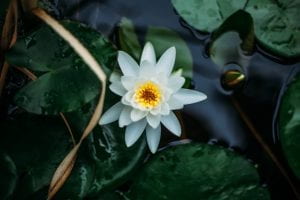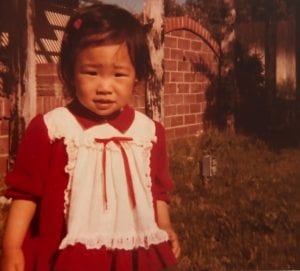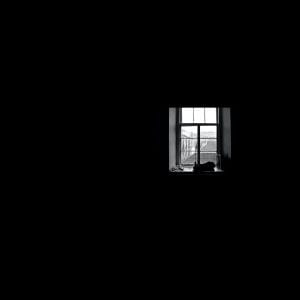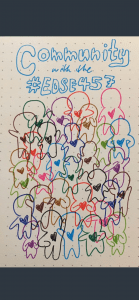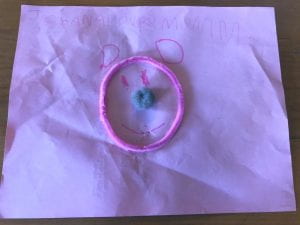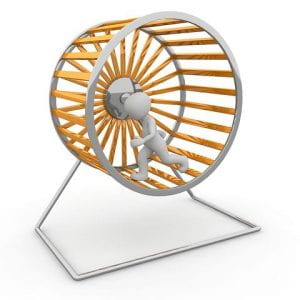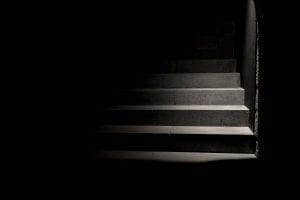
CW: Eating disorder, Suicidality, Trauma (Skip to the Tl;dr if you don’t want to read that content)
Dear Friends,
This post is a hard one, but one I’ve been contemplating for a very long time. It’s a conversation I need to have with you all and there is no better time than today.
May is Asian Pacific American Heritage Month.
May is also Mental Health Awareness Month.
Mental health is something that is not openly talked about in Asian American families and communities. It was certainly not something that was talked about in my family growing up. In fact, problems at home or difficult emotions were always something that shouldn’t be talked about at all, but should be swallowed, held in and kept to ourselves, in our homes, a secret.
I have always cried too much.
I have always talked too much and talked too loudly.
I have always been the black sheep of my family.
I have always carried shame.
I swallowed a lot, for a long time.
Until I couldn’t swallow anything else.
For a long time, I have been fairly open about my struggles with mental health since beginning an academic career in 2012. Mostly, I have been open about my complicated grief process, spanning from the sudden death of my mother in car accident in the spring of my junior year. Grief is a somewhat acceptable form of struggle. I’ve approached my grief and healing with growing honesty and vulnerability in the past few years, particularly over the past year.
But there are some things about me that I haven’t written about because they have felt like too much: too much pain, too much vulnerability, too much shame.
However, shame festers in the silence. And I am not ashamed of where I have come from and who I am today.
Today, I am ready to tell the story of my darkest times, to reckon with these times publicly because in the light, there is healing.
I want to tell this story not just for my healing, but perhaps also because those I love may benefit in knowing that there is a beyond one’s darkest time, because I have come so far from a time that was not so long ago.
And also because I want people to know that you know someone who has struggled with suicidality.
Because you know me.
But, first, a deep breath.
A moment to remember that you are my friends.
A moment to remember that I am not ashamed.
I have never been a good boundary setter. As a teenager, my mother set boundaries for me until she died and when she died, I had no practice in setting boundaries for myself. Wanting to be a people pleaser, I threw myself into working as hard as I could to make other people happy. I was eager, and talented. Working hard made people like me. People were drawn to me because not only would I do things well, but I would listen to them deeply. I could see people in ways they needed to be seen; I could hear their truths and accept them for what they were. I gave and gave, and felt like in return, I gained validation, a sense of why I should stay alive after my mother died.
I needed validation and approval to stay alive, and in fact, the first time I thought about killing myself, I stood by the window of the house where I was living with a rusty razor blade in my hand thinking about how much relief I would feel if I could just die. Because I had been a disappointment. Because people I loved and respected told me that I was a disappointment. And because I thought I was a burden to everyone, that no one understood me and that I was completely alone.
What kept me alive was not wanting my brother to suffer the loss of his entire family in less than a year, and a chance to honor my mother in my valedictorian speech.
I began to work harder to gain people’s approval, to shut off all the bad, selfish things that I might want and stay focused on doing “the right thing” for others, so that people would love me.
Ten years later, shortly after my son was born and my daughters’ adoptions were finalized, I began to get very sick. I lost a lot of weight when breastfeeding my son. I wasn’t sleeping well. This went on for years, and even when my son stopped breastfeeding, I kept losing weight. One of my daughters had a very serious mental health crisis. Because I didn’t understand mental health well, I thought that, in addition to weekly mental health sessions, what my daughter needed most was someone to listen to her. Perhaps this was partly true. But, I became my daughter’s only lifeline. She left therapy when she turned 18. If I was not on the phone with her, she began to spend money to fill the time and emptiness she was feeling. I never told her no. I just kept paying off her credit card bills. I wanted her to be happy, and healthy, and to have someone who deeply cared about her, all the things I needed when I lost my mother at her age. I was naive and well-intentioned, but ill-equipped to support her.
My weight kept dropping. We began to slip into debt. I kept working. I took on more work, in fact, to keep up with my daughter’s spending. I stopped being able to process most foods. I didn’t feel hungry.
I started wanting to die again.
Not to kill myself actively this time, but to die.
I felt it would be better for everyone.
I couldn’t be the mother my son needed.
I couldn’t be the mother my daughters needed.
I couldn’t even conceive of being the wife my husband needed.
I couldn’t work enough to pay our bills.
I had been rejected from multiple academic job searches that I was well-qualified for, without even a phone interview.
I was working 5 part-time jobs at one point, which I finally realized couldn’t continue, so I went back to teaching full-time and was working in an adjunct faculty role at UC Santa Cruz. One night, driving home along Highway 17 in the Santa Cruz mountains, in the dark, I fantasized about just letting my car go over the side of the road, into the mountain or off a mountain into a ravine.
I thought this would be the very best thing for everyone. It would look like an accident. Everyone would assume that I had just fallen asleep at the wheel.
My family could live off of my life insurance money as I had for several years after my mom died.
No one would know that I just couldn’t go on.
But I thought of my toddler and my daughters, and I fought to get myself home.
I didn’t want to die. I just didn’t think I could go on living.
I thought it would get better through working like it had last time, by trying harder, by doing better, but nothing changed.
I finished that semester and was getting ready to start another, where I would share a TA role back at UC Berkeley, closer to my home, while also teaching full-time at my middle school. I had been breaking down crying in front of students when I would talk to my daughter during my prep period, and she would be upset in a way that couldn’t be resolved before I had to go back to teaching.
I was a mess.
On MLK Jr. weekend of 2011, I hit my breaking point. I didn’t want to die or be dead at that moment, but I started feeling like I was going to die. I began sobbing to my husband that I was going to die. I didn’t know why, but I felt like I was going to die. For months, I had been going to specialists and they couldn’t find anything wrong with me, but I was not well. I felt like one day I would just not wake up.
No one believed me. I seemed to be fine.
So, finally, desperate for someone to recognize that I was, indeed, dying, I called for professional help.
I called the number on the back of my insurance card for behavioral health services.
I told them that I didn’t know what was wrong but I felt like I was going to die.
After talking with me for about 15 minutes, and asking me several questions, the triage nurse asked me if I could safely get myself to an emergency room. My husband drove me there and dropped me off.
I told them I needed a psych eval.
I waited patiently in the waiting room.
Eventually, my name was called.
An intake nurse weighed me and took my vital signs.
I was 84 pounds. And my blood pressure was extremely low.
A doctor asked me what was going on. I began to tell them all the things.
Once I started telling my story, I couldn’t stop crying.
The doctor looked at me kindly and told me that they were going to recommend me for inpatient treatment for an eating disorder.
I was confused. How could I have an eating disorder? I wasn’t trying not to eat. I just couldn’t eat.
But I knew I needed to be in the hospital. I needed care.
I was hospitalized inpatient for 10 days and when through 6 weeks of subsequent extended outpatient eating disorder treatment.
In the midst of this, my daughter felt abandoned, I lost one part-time job and had parents complaining to the district at my full-time job that I could not possibly be “that sick” if I was posting on social media.
I felt like everything I had worked so hard for was disappearing. I was disappointing everyone.
On the outside, everything I feared might happen was happening.
But as I started eating again, I stopped wanting to disappear.
Somehow, on the inside, I began feeling more alive.
The program literally saved my life.
Seeking mental health care saved my life.
Hospitalization saved my life.
It helped me to learn to set boundaries, to prioritize what I needed to survive, to recognize yellow and red flags, and to seek out community. I am lucky because I had medical insurance and access to help. Without it, I would not likely be where I am today. I might not be alive.
Mental health treatment did not fix all my problems. It certainly did not change the external stressors that I was facing. But it kept me alive, and it started a process of recovery.
Friends, why does my story matter?
Many of you did not know me at that time, and even if you did, you may not have known what was going on. I hid things well. I still do.
Most of you who know me now would not ever guess how close I was to dying just a decade ago. Or a decade before that.
Mental health is so stigmatized. I didn’t know how to reach out before I reached my breaking point. I only reached out in a state of complete desperation. I had been dying in front of people’s eyes and I couldn’t ask for help.
This year has been so hard for so many of us, including me. It has pushed me to my limits. But, it has also shown me how much I have grown. I am still not the best at boundary setting. I still struggle with overworking and not prioritizing myself. But I am alive, I am in therapy, and I am at a healthy weight. I have a community that sees me and checks in with me regularly. I have friends who will stage a full intervention when they see me going down the path to illness again.
Maybe you also feel pushed to your limits.
Maybe you don’t and have the strength to support someone.
Maybe you’re still reading because you’re interested in my business…
I’m not sure, but I’m wrapping soon.
This letter to you has become long, so here’s the Tl;dr:
Your life matters.
Your mental health matters.
Seeking mental health care saves lives.
It is SO SO HARD, but you can do it. And if you don’t feel like you can do it alone, find someone who will help you do it.
There is life after a crisis.
Check on your strongest friends, the ones who do all the things.
We don’t see the things we aren’t looking for.
I love you, Friends. And I love myself, and where I’ve come in this journey. I am not afraid or ashamed of my mental health struggles. I am proud of my willingness to heal, of my humanity and my better health, of seeking help in community. There is hope in community.
I see you because I see myself in you.
I am holding space for you to get what you need to live and to embrace your full humanity.
Take care,
Betina
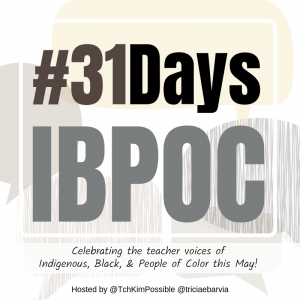
This blog post is part of the #31DaysIBPOC Blog Series, a month-long movement to feature the voices of indigenous and teachers of color as writers and scholars. Please CLICK HERE to read yesterday’s blog post by Chanea Bond (and be sure to check out the link at the end of each post to catch up on the rest of the blog series).




